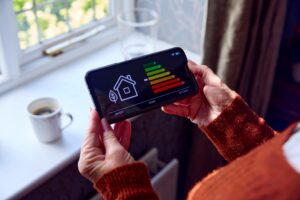Everything You Need to Know About EPCs: A Guide for Homebuyers
When buying or selling a property, the term Energy Performance Certificate (EPC) is likely to come up. When listing a property for sale you will need one as well as when you are viewing properties you will need to ensure it has an EPC beforehand.
What is an EPC?
- An Energy Performance Certificate (EPC) is a document that provides an assessment of a property’s energy efficiency and environmental impact. It includes:
- Energy Efficiency Rating: Rated on a scale from A (most efficient) to G (least efficient).
- Estimated Energy Costs: Highlights how much energy the property is likely to use and its approximate running costs.
- Recommendations: Suggestions for improving energy efficiency and reducing costs.
EPCs are designed to help homeowners and buyers understand a property’s energy performance and what it might cost in utility bills throughout the year.
Do I Need an EPC If I’m Selling My House?
Yes, if you’re selling your house, you must have a valid EPC. It’s a legal requirement to provide an EPC when marketing your property, so buyers can assess its energy performance. The certificate is valid for 10 years, so if you already have one, it may still be valid.
Is an EPC Legally Required?
Yes, EPCs are legally required in the UK for almost all properties being sold, rented, or newly built. The only exceptions include listed buildings or properties due for demolition. Failure to provide an EPC can result in fines of up to £5,000.
Do I Need an EPC for the House I’m Buying?
While it’s not your responsibility as a buyer to obtain an EPC, the seller or estate agent must provide you with one. Reviewing the EPC before buying helps you understand the energy performance of your potential new home and consider any associated costs.
Are EPCs Important When Buying a House?
EPCs are valuable for several reasons:
- Energy Efficiency: Homes with better ratings tend to have lower energy bills.
- Environmental Impact: If sustainability is important to you, the EPC outlines a property’s carbon footprint.
- Future Costs: A low rating might indicate the need for costly improvements, such as insulation or new heating systems.
While an EPC shouldn’t necessarily deter you from buying a property, it provides you with plenty of information for planning and budgeting.
What Do the Different EPC Ratings Mean?
EPC ratings range from A to G:
- A (Most Efficient): Excellent energy efficiency; lowest running costs.
- B-D (Above Average to Average): Decent efficiency; common for modern homes.
- E-G (Below Average): Poor efficiency; may require significant upgrades to improve performance.
The closer to A, the better the energy efficiency and lower the estimated costs.
What Does an EPC Include?
An EPC provides:
- The current and potential energy efficiency rating.
- A breakdown of energy use (e.g., heating, lighting, hot water).
- Suggestions for improvement (e.g., better insulation, solar panels).
- Estimated savings from implementing these recommendations.
Is It Worth Buying a House with a Poor EPC Rating?
Buying a house with a low EPC rating can be worthwhile, but you should factor any increased costs due to the lower rating:
- Renovation Costs: Improving energy efficiency can be expensive, though grants and schemes may help offset costs.
- Resale Value: Homes with poor ratings may be harder to sell in the future, especially as energy standards become stricter.
- Living Costs: A low-rated home will likely have higher energy bills.
If the house has other desirable features and you’re prepared to invest in upgrades, a poor EPC rating may not be a dealbreaker.
How Much Does an EPC Cost?
The cost of obtaining an EPC varies but typically ranges from £35 to £120, depending on the property size and location. Sellers or landlords are responsible for arranging and covering this cost.
How long are EPCs valid for?
EPCs are valid for 10 years, so it is worth holding onto the report once your house sale has gone through. If you are looking to rent or sell after these 10 years you will need to renew the report.
Understanding EPCs is another part of the buying and selling process. EPCs provide insights into energy efficiency, running costs, and potential improvements. While not the sole deciding factor in a property purchase, an EPC helps you make informed decisions about your investment and future expenses.




